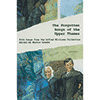
MARTIN GRAEBE - The Forgotten Songs Of The Upper Thames: Folk Songs From The Alfred Williams Collection
The Ballad Partners ISBN: 9781916142435
I have always been fascinated by the life and work of Alfred Williams. Born into an agricultural family in Wiltshire in 1877, he left the land to pursue the higher wages available at the burgeoning Great Western Railway works in nearby Swindon. There he worked for 23 years in the iron forge as a steam-hammer operator, “but a few yards” as he put it, from where my great-grandfather (about 10 years older than him) was working as a boilermaker. The work was, to us, almost unbelievably brutal. Williams described how, even in winter, they were glad when the rain, driven by the wind, poured into the sheds onto the half-naked men toiling beneath and giving them welcome respite from the extraordinary heat. The boilermaker workers had intense noise to deal with – many went deaf. Unlike many of his peers, Williams looked to educate himself, wrote poetry, described conditions in the factory (a book which could only be published after he had left) and, most important to this volume, collected folksongs in the locality. In contrast, my great-grandfather and his two sons, also working in the GWR works, didn’t sing but played music – so whilst Williams was collecting folksongs, they were playing for dances, almost certainly in some of the villages that Williams was visiting. Subsequent research on Williams has been patchy, if enthusiastic – with notable contributions from the Swindon Folk Song Club and Andrew Bathe’s doctoral thesis. Leonard Clark wrote an un-academic, if heartfelt biography (although he later felt he had overstated Williams’ case as a poet), but little attention was paid to his song collection. This was probably due to several reasons. Williams had no formal musical ability, so was only able to note the words, whereas most collectors appeared to be primarily interested in the tunes. The music did not interest Williams, but he wanted his publication to be representative of what people sang – he wasn’t looking for the ‘Crystal Spring’ of pure folksong. A good example of this are the songs of Ablington’s William Mills – songs obviously designed to entertain (as was Mills’s reading an excerpt of Roger Plowman as described in J. Arthur Gibbs’ A Cotswold Village) and which would be immediately jettisoned by most folk song collectors of the period. Williams published the fruits of his collection in an ongoing column in the Wilts and Gloucestershire Standard, and his book, Folk Songs of the Upper Thames (1932), published just over half of these songs, following which they were almost completely ignored. An excellent website was put up on the Wiltshire Community site (https://history.wiltshire gov.uk/community), which gives much more information.
Now, we have a volume giving us the entirety (as much as can be said) of the songs which were not included in Williams’ 1932 volume. The introduction gives an excellent introduction to Williams and his work plus fascinating biographies of his principal singers. The texts are clearly printed, giving the full songs, and technical information such as Roud numbers. And each is followed by information on the song – academically excellent, vital for appreciating the context and unfailingly fascinating. Martin Graebe does not fall into the rabbit hole of suggesting possible tunes, but gives plenty of references and suggestions as to where the industrious reader may seek them out. There are one or two infelicities – Cricklade at one point drifts into Gloucestershire, and the song The Isle Of Wight isn’t unique to Williams - the Roud index has given two separate numbers (27986 and 32575) to the same song. There is a terrific sound recording of it, entitled Nancy, being sung by George Tandy, who travelled the country as a labourer on the railways, but was recorded by Percy Grainger in Winchcombe Workhouse in 1908. It also appears on a broadside in the Madden collection. But this really is extreme nitpicking!
This is an important book making available an important collection. It has been beautifully put together, excellently printed in a very readable typeface and the cover adorned with a lovely painting of Williams and singer Elijah Iles by Christine Molan. It’s also very reasonably priced. I urge anyone with an interest in English folk song to obtain this volume and repay the love and effort which has gone into its production.
www.theballadpartners.co.uk
Paul Burgess
This review appeared in Issue 142 of The Living Tradition magazine
